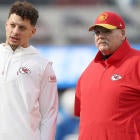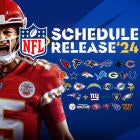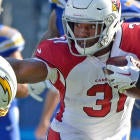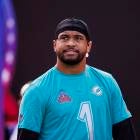
Jordan Love's contract situation moves to the forefront for the Green Bay Packers. The quarterback became eligible for a new deal on May 3. That's when the one-year waiting period under the NFL collective bargaining agreement for Love to sign a new deal ended.
The Packers and Love both hedged their bets in signing a one-year, $13.5 million contract extension worth up to $22.5 million through salary escalators dated May 3, 2023. The deal was in lieu of the Packers making a decision about picking up the 2020 first-round pick's fully guaranteed $20.272 million fifth-year option for 2024.
Love is scheduled to make $11 million in 2024, thanks to earning $5 million of the $9 million salary escalator due to his 2023 performance, playtime and Green Bay's success. His 2024 salary cap number is $12,757,731.
Packers general manager Brian Gutekunst indicated at the NFL annual owners meeting held in late March that preliminary contract discussions had taken place. Aaron Rodgers, Love's predecessor as Packers quarterback, is likely going to loom large in negotiations of a new deal for a variety of reasons.
One interesting twist is that Love and Rodgers are both represented by the same agency, Athletes First, but by different primary agents. Rodgers has David Dunn, who co-founded Athletes First in 2001. Love's agents are David Mulugheta and Andrew Kessler. Expect how the Packers treated Rodgers with his veteran contracts to be used against Green Bay because of the same agency dynamic.
Rodgers' first contract extension
There is a school of thought that Love doesn't have enough of a track record for the Packers to make a massive financial commitment to him. Rodgers had a smaller body of work when he was given his first veteran contract. The Packers signed Rodgers to a five-year extension averaging $12.704 million per year seven games into his fourth season -- his first as a starter -- at the beginning of November in 2008.
The deal made Rodgers the NFL's fourth- or fifth-highest paid player depending on interpretation. Rodgers was fourth behind Carson Palmer, Ben Roethlisberger and Peyton Manning's respective deals with the Cincinnati Bengals, Pittsburgh Steelers and Indianapolis Colts averaging $16,166,667, $14,664,417 and $14 million per year provided Michael Vick is excluded.
Technically, Vick remained under contract with the Atlanta Falcons until June 2009 with his $13 million-per-year extension although he had been suspended indefinitely by NFL commissioner Roger Goodell in 2007 and was finishing a 23-month prison sentence for his role in a dogfighting ring. A final resolution with the grievance the Falcons filed against Vick to recoup money from his contract was why he hadn't been released when Rodgers signed his deal.
Love and Rodgers were comparable statistically in their fourth NFL season, which is highlighted in the following chart.
| Player | Games | Completions | Attempts | Comp. % | Yards | TDs | INT | Passer Rating | Record |
|---|---|---|---|---|---|---|---|---|---|
Love | 17 | 372 | 579 | 64.2 | 4159 | 32 | 11 | 96.1 | 9-8 |
Rodgers | 16 | 341 | 536 | 63.6 | 4038 | 28 | 13 | 93.8 | 6-10 |
The biggest difference is Love took a major step forward over the second half of the 2023 season that translated into team success. He completed 70.3% of his passes for 2,150 yards with 18 touchdowns and just one interception to post a 112.7 passer rating while the Packers went 6-2 to secure a playoff berth.
Based on the precedent set with a young Rodgers, the Packers should at least be willing to make Love the NFL's fourth- or fifth-highest paid player. At a minimum, Love should be in the $48.5 million-to-$49 million-per-year neighborhood by approximating the midpoint of the league's fourth- and fifth-highest paid player.
Philadelphia Eagles quarterback Jalen Hurts is currently fourth in the NFL salary hierarchy. He received a five-year, $255 million extension averaging $51 million per year that briefly made him the league's highest-paid player in April 2023. The deal is worth as much as $270 million because of salary escalators. There are $180 million in overall guarantees, of which $110 million was fully guaranteed at signing.
Kansas City Chiefs quarterback Patrick Mahomes is right behind Hurts. The two-time NFL MVP and three-time Super Bowl MVP's contract was renegotiated during the early part of the 2023 regular season.
The Chiefs didn't add any new money to Mahomes' deal since he had eight more years left on his contract. The deal still expires after the 2031 season. Money was redistributed from the latter years so his contract is no longer extremely backloaded.
There are $208.1 million of guarantees in Mahomes' renegotiated contract, which is the cash from 2023 through 2026. A total of $133.7 million was fully guaranteed at signing. The total value of the renegotiated nine-year contract is $417.05 million for an average of $46,338,889 per year.
Ordinarily, a team would be able to easily distance itself from a deal done over 15 years ago. That isn't the case with the Packers. Current Packers president and CEO Mark Murphy served in the same capacity when Rodgers signed his first veteran contract. He assumed these roles in January 2008.
Rodgers' final Packers contract
The Packers have demonstrated a comfort with paying a starting quarterback $50,271,667 per year. That was the average yearly salary of the final deal Rodgers signed with the Packers in March 2022.
Rodgers became the NFL's first $50 million-per-year player with a contract widely considered to be $150.815 million over three years although there were two additional below-market years (2025 and 2026) in the deal. He established new benchmarks for guaranteed money in football contracts with $150.665 million in total guarantees and $101.515 million fully guaranteed at signing. Both of these marks have been surpassed by numerous quarterbacks in subsequent signings.
It wouldn't be surprising for Love's camp to not only target more than this deal, but to insist on their client becoming the league's highest-paid player, like Rodgers. The Packers will surely push back on this idea noting that Rodgers was coming off back-to-back NFL MVP seasons when he received the deal.
Love's case could be bolstered because as a first-year starter he outperformed Rodgers during his last season in Green Bay. The chart below outlines their production.
| Player | Games | Completions | Attempts | Comp. % | Yards | TDs | INT | Rating | Record |
|---|---|---|---|---|---|---|---|---|---|
Love | 17 | 372 | 579 | 64.2 | 4159 | 32 | 11 | 96.1 | 9-8 |
Rodgers | 17 | 350 | 542 | 64.6 | 3695 | 26 | 12 | 91.1 | 8-9 |
By Rodgers' standards, 2022 was a down year. The Packers missed the playoffs for the first time since 2018 as Rodgers turned 39 years old late in the season.
Love was the best quarterback on the field in Green Bay's shocking wild-card game win over the Dallas Cowboys with 2023 NFL MVP runner-up Dak Prescott as his counterpart. He more than held his own in a divisional playoff loss against the San Francisco 49ers. The opposing quarterback, Brock Purdy, was also an NFL MVP finalist.
Gutekunst didn't do himself any favors with his praise of Love in a recent Sirius XM NFL Radio interview. The Packers general manager said, "Certainly he (meaning Love) played at a very, very, high level in the second half of last year and I think the sky's the limit for him."
Statements like this about a client from a high-ranking team executive or the head coach are music to an agent's ears. Love's camp will surely attempt to monetize Gutekunst's complimentary words. For example, a position could be taken that since Love is just scratching the surface of his talent where his best football is ahead of him, the sky should be the limit for his compensation.
Bengals quarterback Joe Burrow is the current NFL salary standard bearer. He signed a five-year, $275 million extension averaging $55 million per year last September right before the start of the 2023 regular season. The deal is worth up to $281.25 million, thanks to $1.25 million of annual incentives in the extension years (2025 through 2029). Burrow has $219.01 million of salary guarantees in which $146.51 million was fully guaranteed at signing.
It's the most for these contract metrics outside of the $230 million in Deshaun Watson's fully guaranteed five-year contract with the Cleveland Browns. Burrow also got an extremely player-friendly structure from the Bengals in which the first three new contract years average $61,320,327 per year.
The ink was barely dry on the five-year, $262.5 million extension averaging $52.5 million per year Los Angeles Chargers quarterback Justin Herbert signed at the beginning of training camp last July when Burrow replaced him at the top of the NFL pay scale. There's $2.5 million of base salary escalators each in 2028 and 2029 so the extension's maximum value is $267.5 million.
Herbert's deal has $193,738,375 in guarantees, of which $133,738,375 is fully guaranteed at signing. The total amount that can become guaranteed is $218,738,375. That's because $25 million of Herbert's unsecured $47 million 2028 base salary is guaranteed for injury on the third day of the 2026 league year (mid-March 2026). The $25 million becomes fully guaranteed on the third day of the 2027 league year (mid-March 2027).
The NFL pay scale was dramatically reset on each of Rodgers' last three contracts with the Packers. The smallest increase was in 2013 when Rodgers' $22 million per year was 9.45% more than Baltimore Ravens quarterback Joe Flacco's $20.1 million per year. Even if the Packers were amendable to Love becoming the league's highest-paid player, a similar increase would surely be a bridge too far. The Packers would be making Love the NFL's first $60 million-per-year player.
The largest increase among the four quarterbacks to become the NFL's salary king last year was Herbert getting 0.96% above Ravens quarterback Lamar Jackson's $52 million per year. Burrow got the biggest jump. His deal is 4.76% more than Herbert's.
The average increase was 2.3%. Should the Packers be inclined to do the same for Love, his extension would average slightly more than $56.25 million per year.
Time is on Love's side
The Packers are usually proactive in getting contract extensions done with core players, which Love certainly is. His best deal may come by waiting to see if there are any new developments in the quarterback market before training camps open in late July or the start of the regular season in early September that could be beneficial before pulling the trigger.
The game changer would be Prescott getting something done with the Cowboys. It's conceivable that Prescott could become the NFL's first $60 million-per-year player provided he is willing to fully exploit his leverage given the Cowboys are prohibited from designating him as a franchise player next offseason if he plays out his contract. The odds of topping a blockbuster Prescott deal would be remote, but Love would have more ammunition to get more than Burrow's $55 million per year.
Tua Tagovailoa's potential contract extension with the Miami Dolphins could have the most relevance to Love's situation. The Dolphins are seemingly preparing to make Tagovailoa one of the league's highest-paid players after letting defensive tackle Christian Wilkins leave on the open market rather than using a franchise tag on him and offensive guard Robert Hunt joining the exclusive $20 million-per-year interior offensive lineman club in free agency.
Love's fellow 2020 first-round pick is also represented by Athletes First. These deals will probably get done in an order that's advantageous for Athletes First. Presumably, whichever of these two quarterbacks signs first will likely serve as the salary floor for the other.
Contract structure
Love should want to give up no more than four new years in his contract. This would allow him to be best positioned for the expected significant salary cap growth in the coming years, thanks to the latest media rights deals reportedly worth $113 billion over 11 years and an influx of gambling revenue.
That might not be possible after the developments at the top of the quarterback market last year. Giving up five new years became the norm. Burrow, Herbert and Hurts each signed five-year extensions in which their respective contracts added five new years. Jackson's rookie contract had expired when he signed for five years.
The Packers will almost surely have to make a major structural accommodation to Love that was consistently done for Rodgers in order to consummate a deal. Generally, Green Bay is in the dark ages when it comes to structuring contracts for veteran players. The only guaranteed money in Green Bay veteran contracts is a signing bonus and/or a roster bonus payable within a few days of signing. The bigger deals contain an unsecured third or fifth day of the league year roster bonus in the second and third years. The roster bonuses are supposed to be substitutes for additional contract guarantees. The overall guarantees in Packers contracts are less than comparable deals on other teams.
Rodgers has been the lone exception. His 2013, 2018 and 2022 deals had traditional salary guarantees.
The Packers used one of the NFL's more complex contract structures with Rodgers in 2022. The deal had two option bonuses, one in 2023 and the other in 2024.
Option bonuses are prorated over the life of a contract (up to a maximum of five years), including the option years, beginning in the league year when the option is exercised. From a salary cap standpoint, the presumption is option years will be picked up.
Teams can keep a player's salary cap number low or manageable in the initial years of a contract. There will eventually be a big jump in the player's cap number because of the proration attributed to each year with the multiple options. For example, Jackson's smallest cap number was in 2023, the first year of his contract. His cap number balloons to $74.65 million in 2026 and 2027, each of the last two years of his five-year contract. The big drawback with this structure is there can be excessive dead money, a salary cap charge for a player no longer on a team's roster, in the event of a release, a trade or retirement.
Multiple option bonuses are rarely used although this complicated type of contract structure is gaining traction with the league's most lucrative deals. Each of the four quarterbacks who signed for in excess of $50 million per year in 2023 had at least two option bonuses in their contracts. There's a good possibility that the Packers will continue this emerging trend with Love's extension, especially in light of how Rodgers' last deal was structured.
The alternative to a contract extension
Barring a major regression this upcoming season, Love would be destined for a franchise tag in 2025 if he played out his contract. Generally, quarterbacks are rarely in a position to be franchised because new deals are usually in place well before the decision needs to be made. In the last 10 offseasons, only three quarterbacks -- Kirk Cousins (2016 and 2017), Prescott (2020 and 2021) and Jackson (2023) -- have been designated as franchise players.
There are two types of franchise designations, non-exclusive and exclusive. The non-exclusive tag allows a player to negotiate with other NFL teams, but if he signs an offer sheet with another club, his team has five days to match the offer. If the offer is not matched, his team will receive two first-round picks as compensation from the signing team. The non-exclusive franchise tag for quarterbacks next year should be 14.366% of 2025 salary cap, which should put the number right around $39 million. This assumes a 2025 salary cap in the $270 million neighborhood, which would be approximately a six percent increase over the current $255.4 million figure.
The non-exclusive tag could make the Packers vulnerable to an offer sheet by a quarterback-needy team with an abundance of salary cap room that might be difficult to match. The Ravens took a calculated risk with Jackson by giving him the non-exclusive tag. Curiously, some quarterback-needy teams where Jackson would have been a significant upgrade were quick to publicly state there wouldn't be an interest in him. A market for his services never developed before he re-signed with the Ravens.
The two first-round picks for Love would be considered a good value relative to the trade compensation for quarterbacks perceived to be in the upper echelon when dealt in recent years. In March 2022, the Browns acquired Watson and a 2024 sixth-round pick from the Houston Texans for 2022, 2023 and 2024 first-round picks, a 2022 fourth-round pick, a 2023 third-round pick and a 2024 fourth-round pick. A couple of weeks earlier, the Seattle Seahawks dealt Russell Wilson and a 2022 fourth-round pick to the Denver Broncos for multiple players (tight end Noah Fant, defensive lineman Shelby Harris and quarterback Drew Lock), 2022 and 2023 first-round picks, 2022 and 2023 second-round picks and a 2022 fifth-round pick.
The last three times prior to Jackson quarterbacks were designated as franchise players, the exclusive version was used. A player cannot negotiate with other teams with the exclusive franchise tag. Next year's quarterback exclusive franchise number will be the average of the top five 2025 quarterback salaries (salary cap numbers with some minor adjustments) at the end of the restricted free agent signing period on next April 18. It currently projects to $57.945 million. This number is subject to change depending on new quarterback deals, contract restructures, pay cuts and/or releases between now and then.
The 2024 quarterback draft class was extremely top heavy with an unprecedented six passers being taken in the first 12 picks. The Packers might not have the same luxury the Ravens had with Jackson on which designation to use because the 2025 crop of quarterbacks pales in comparison. The exclusive tag possibly being a necessity surely isn't lost on Love's representatives or the Packers.





















